What are the benefits of pine nuts for women?
From a botanical point of view, pine nuts have nothing to do with nuts. These are the seeds of cedar pine trees, hidden in a hard shell. The product contains saturated and unsaturated fats, amino acids, large amounts of vitamins E and K, potassium, magnesium, phosphorus, zinc and iron - nutrients necessary for maintaining hormonal levels, healthy bones, immune and nervous systems.
About the benefits and harms of cedar trees nuts for women's body read the article.
Calorie content and chemical composition
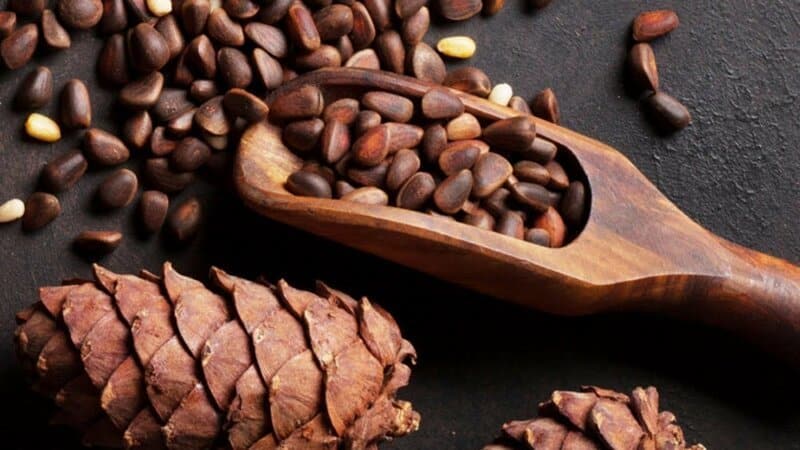
According to scientific data, pine nuts are the seeds of the Siberian pine tree. The plant is not considered a true cedar, which is native to Lebanon. By the way, the seeds of Lebanese cedars are not eaten. Cedar pine received its name in the 15th century, when Russians first set foot on Siberian soil. Admired by the beauty of the unknown trees, people compared them with the cedars described in the Bible.
Siberian cedars reach 40 m in height and live about 500 years. Seeds appear every 5-6 years.
Interesting! Siberian cedar is a distant relative of the Italian pine tree. The author of the famous fairy tale, Carlo Collodi, named Pinocchio after the nut of this tree.
In ripe elongated cones, from 30 to 150 seeds ripen. The harvest from one tree is about 50 kg. Each nut is encased in a dense, inedible shell, which is separated using a special pneumatic separator.
The taste of pine nuts is sweetish, delicate, creamy and nutty with light pine notes. There should be no bitter taste.If the product is bitter, it means it has gone bad.
The table shows the chemical composition of 100 g of pine nuts:
| Name | Content | Norm |
| Beta carotene | 0.017 mg | 5 mg |
| Vitamin B1 | 0.364 mg | 1.5 mg |
| Vitamin B2 | 0.227 mg | 1.8 mg |
| Vitamin B4 | 55.8 mg | 500 mg |
| Vitamin B5 | 0.313 mg | 5 mg |
| Vitamin B6 | 0.094 mg | 2 mg |
| Vitamin B9 | 34 mcg | 400 mcg |
| Vitamin C | 0.8 mg | 90 mg |
| Vitamin E | 9.33 mg | 15 mg |
| Vitamin K | 53.9 mcg | 120 mcg |
| Vitamin PP | 4.387 mg | 20 mg |
| Lutein and zeaxanthin | 0.009 mg | 5 mg |
| Potassium | 597 mg | 2500 mg |
| Calcium | 16 mg | 1000 mg |
| Silicon | 50 mg | 20–50 mg |
| Magnesium | 251 mg | 400 mg |
| Sodium | 2 mg | 1300 mg |
| Sulfur | 150 mg | 1000 mg |
| Phosphorus | 575 mg | 800 mg |
| Iron | 5.53 mg | 18 mg |
| Iodine | 0.025 mg | 0.1–0.2 mg |
| Manganese | 8.802 mg | 2 mg |
| Copper | 1.3 mg | 1 mg |
| Selenium | 0.007 mg | 0.055 mg |
| Zinc | 6.45 mg | 12 mg |
| Valin | 0.69 g | — |
| Histidine | 0.34 g | — |
| Isoleucine | 0.54 g | — |
| Leucine | 0.99 g | — |
| Lysine | 0.54 g | — |
| Methionine | 0.26 g | — |
| Threonine | 0.37 g | — |
| Tryptophan | 0.11 g | — |
| Phenylalanine | 0.52 g | — |
| Alanin | 0.68 g | — |
| Arginine | 2.41 g | — |
| Aspartic acid | 1.3 g | — |
| Glycine | 0.69 g | — |
| Glutamic acid | 2.93 g | — |
| Proline | 0.67 g | — |
| Serin | 0.84 g | — |
| Tyrosine | 0.51 g | — |
| Cysteine | 0.29 g | — |
| Saturated fatty acids | 7.98 g | 18.7 g |
| Monounsaturated fatty acids | 18.7 g | 16.8 g |
| Polyunsaturated fatty acids | 34.1 g | 11.2–20.6 g |
| Omega-3 fatty acids | 0.510–0.528 g | 0.9–3.7 g |
| Omega-6 fatty acids | 33.959 g | 4.7–16.8 g |
Nutritional value of 100 g of product:
- calorie content - 673 kcal;
- proteins - 13.69 g;
- fats - 68.37 g;
- carbohydrates - 9.38 g;
- fiber - 3.7 g;
- water - 2.28 g;
- ash - 2.59 g.
Benefits and harms
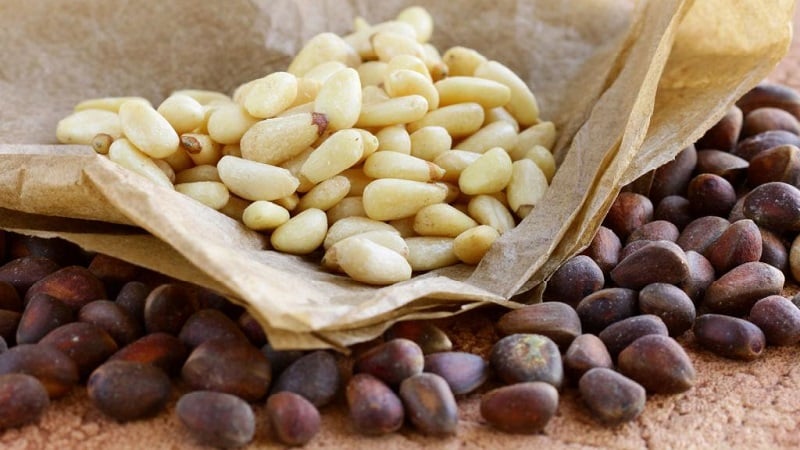
Let's look at the benefits of pine nuts for women. Their positive effects on the female body are varied and extensive.They have a general strengthening, immunomodulatory, and tonic effect when consumed regularly.
The ability of nuts to reduce the level of “bad” cholesterol has been scientifically proven. This reduces the risk of stroke and atherosclerosis due to blockage of blood vessels with cholesterol plaques. In 2014, scientists conducted a study that found a decrease in lipid levels in women with metabolic syndrome with regular consumption of pine nuts.
Reference! Metabolic syndrome is the general name for a set of pathologies: hypertension, obesity, type II diabetes.
Magnesium in pine seeds helps control blood pressure. Its increase threatens the development of heart failure, aneurysm, and loss of vision.
Unsaturated fats, vitamins E and K, manganese and magnesium prevent cardiovascular diseases and improve blood clotting.
Vitamin K is indispensable in the structure of bones; a sufficient amount of it reduces the risk of fractures after 50 years by 65%. Regular consumption of pine nuts prevents the development of osteoporosis and increases bone mineralization.
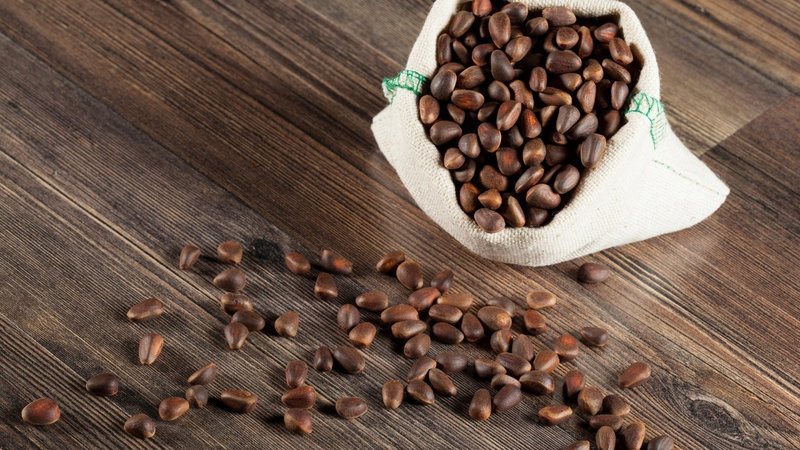
The product reduces the risk of developing pancreatic and colon cancer due to its high concentration of magnesium. Research in this area has proven that reducing magnesium intake by 100 mg per day increases the risk of developing cancer by 24%. Colorectal cancer (malignant disease of the large intestine) is most common among women who have entered menopause.
An alcohol tincture on pine nut shells is used to treat uterine fibroids and normalize the psycho-emotional background.Pine nuts are recommended to be consumed during painful menstruation to stabilize the physical and emotional state.
Nuts contain lutein, or the “eye vitamin.” Most people do not get enough of it from foods, and the body is not able to synthesize this element. There are about 600 carotenoids, 20 of which are found in the human body. Moreover, two of them - lutein and zeaxanthin - support visual function, prevent macular degeneration and the development of glaucoma, and reduce the negative effects of ultraviolet radiation.
Healthy! In 2015, scientists studied the effects of magnesium on mental health. The study showed that the macronutrient reduces symptoms of anger and irritability, increases endurance and prevents depression.
Iron, magnesium and monounsaturated fats increase vitality and endurance, and help you recover faster after strength training.
Pine nuts control type II diabetes mellitus and prevent the development of complications associated with this disease (decreased visual acuity, stroke). When consumed daily, sugar and cholesterol levels are normalized.
Zinc and manganese increase immunity, maintain hormonal balance, connective tissue density, and promote skin regeneration. Iodine normalizes the health of the thyroid gland. Vitamin B2 is involved in the synthesis of corticosteroids - hormones that relieve inflammation of the skin and genitourinary system.
Pine nuts are a source of vitamin E, which is especially beneficial for women suffering from alopecia areata and thinning hair. With regular use of the product, hair becomes strong, smooth and shiny.
Vitamins, minerals and antioxidants maintain youthful skin, slow down aging, moisturize and nourish it, treat psoriasis, acne, eczema and furunculosis.
During pregnancy and lactation
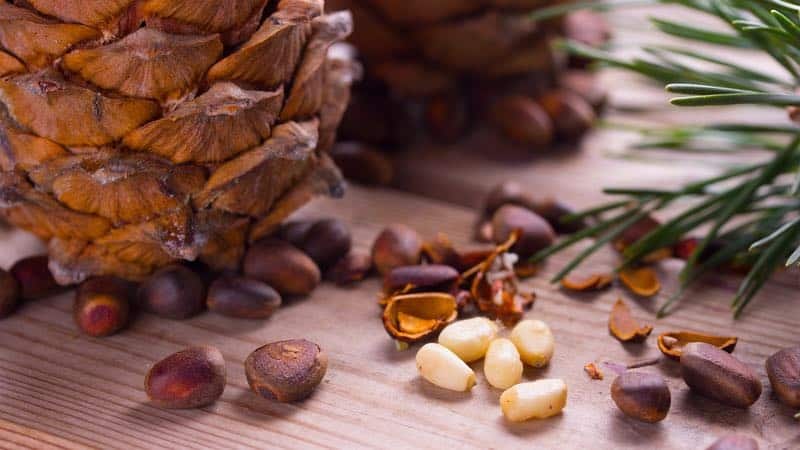
Pine nuts improve blood circulation and prevent venous congestion - these problems often affect women during pregnancy.
Fiber improves intestinal motility and prevents the development of constipation. Plant protein and iron, ascorbic acid, fatty acids support immunity, hemoglobin levels, participate in the formation of the baby’s brain and prevent oxygen starvation. During lactation, pine nuts increase the production of breast milk and increase its nutritional value.
When losing weight
Despite the high calorie content, the product helps to lose weight and keep it under control. The effect is based on stimulation of the synthesis of cholecystokinin, a hormone that transmits saturation impulses to the brain. Nutritionists recommend eating a handful of pine nuts half an hour before meals.
The high nutritional value of the product helps fight obesity. Regular consumption of nuts increases insulin resistance and reduces body fat, reduces appetite and dulls the feeling of hunger.
Reference! Pine nuts are ideal for an evening snack. Protein fills the body with energy and restores muscle tissue.
Contraindications
Pine nuts can cause an allergic reaction, including anaphylactic shock. People with nut allergies should not consume this product.
Some suffer from Pine-Mouth Syndrome, an allergic reaction that causes a metallic or bitter aftertaste in the mouth after eating fungus-ridden and rancid pine nuts. There is no treatment, all that remains is to completely abandon them.
Negative symptoms occur with excessive consumption of the product. General weakness, dizziness, nausea, vomiting, bitterness in the mouth, inflammation of the gastrointestinal tract and gall bladder develop.
The product is contraindicated for children under 3 years of age. Small grains are potentially dangerous for babies: if accidentally swallowed or inhaled, they lead to blockage of the respiratory tract.
Norm and methods of use
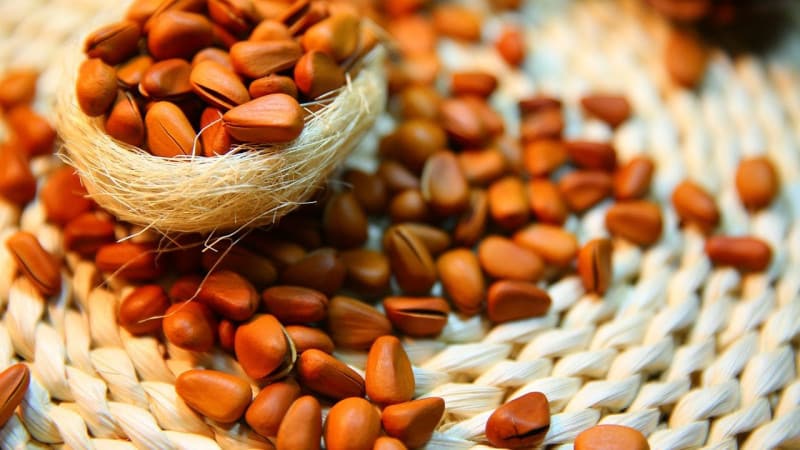
The average daily intake of pine nuts is 2-3 tbsp. l., maximum - ½ faceted glass or 70 g. The product is recommended to be consumed fresh or lightly fried in a dry frying pan. However, nutritionists insist on the first option, citing the fact that heat treatment kills beneficial substances and reduces the taste of nuts. The product is widely used in cooking: added to salads, cookie dough, pies, and cake layers.
Without pine nuts it is impossible to imagine the classic Italian pesto sauce with green basil, Parmesan and aromatic olive oil.
The grains are combined with meat, fish, vegetables, fatty cheeses, and white acacia honey. They are put in muesli, oatmeal, granola, cottage cheese, and chocolate. Pine nuts complement salads based on Chinese cabbage, arugula, spinach, green onions, cucumbers, and avocado.
The product does not combine with salt and pepper. In the composition of kozinaki, the original taste is lost.
Conclusion
Pine nuts are a healthy product that replenishes vitamins and minerals in the body.Amino acids fight free radicals, relieve inflammation, and support the body's immune response. Saturated fats promote weight loss by suppressing appetite and keeping you feeling full for a long time. Lutein supports eye health. Potassium, magnesium, phosphorus, zinc, iron and iodine normalize hormonal levels.
Vitamin K increases bone mineralization and prevents the development of osteoporosis in women over 50 years of age. Tocopherol maintains the beauty of hair and skin and has antioxidant properties. Cedar nuts are good for women during pregnancy and lactation: the rich chemical composition promotes the normal development of the baby, supports the health of the mother, and helps increase the amount of breast milk.